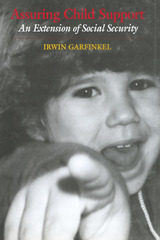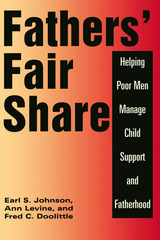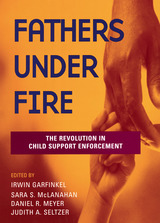6 books about Child support

Allocation of Income within the Household
Edward P. Lazear and Robert T. Michael
University of Chicago Press, 1988
Allocation of Income within the Household develops an important new economic model of income distribution within the family, one that attempts to determine which family characteristics affect spending patterns. Professors Lazear and Michael base their work on an analysis of the 1972-73 Consumer Expenditure Survey and test their conclusions against the 1960-61 survey to verify the persistence of the effects discovered. They find, for example, that the average household spends $38 per child for every $100 spent per adult and that the level of relative and absolute expenditure on the child rises with the level of education of the head of the household.
Lazear and Michael also explore the implications their study may hold for the process of determining child support payments in households that dissolve. They argue that, unless the spending of every dollar can be monitored, alimony cannot be disentangled from child support. They also develop several criteria by which income might be distributed among family members, and, using one of those criteria, they present a series of tables that suggest the appropriate payment from one parent to another given family size, structure, and income level. Their model is particularly useful because it takes account of the ways other family members who were not part of the original household may contribute income to the new household. Other issues considered include the appropriate way to deal with children with special needs and the timing of transfer payments.
Lazear and Michael also explore the implications their study may hold for the process of determining child support payments in households that dissolve. They argue that, unless the spending of every dollar can be monitored, alimony cannot be disentangled from child support. They also develop several criteria by which income might be distributed among family members, and, using one of those criteria, they present a series of tables that suggest the appropriate payment from one parent to another given family size, structure, and income level. Their model is particularly useful because it takes account of the ways other family members who were not part of the original household may contribute income to the new household. Other issues considered include the appropriate way to deal with children with special needs and the timing of transfer payments.
[more]

Assuring Child Support
An Extension of Social Security
Irwin Garfinkel
Russell Sage Foundation, 1992
In the United States, rates of divorce and out-of-wedlock childbirth are climbing so dramatically that over half of the next generation is likely to spend part of its childhood in single-mother families. As many as half of these families will live in poverty, caused in large measure by the failure of current government regulations to secure adequate child support from absent parents and to assure minimum support when parents cannot provide it. Assuring Child Support introduces the Child Support Assurance System, a remedy to this problem that is both feasible and affordable, a practical reform that is within the nation's grasp. "An extremely well-written and provocative book." —Eastern Economic Journal
[more]

Child Support
The Next Frontier
J. Thomas Oldham and Marygold S. Melli, Editors
University of Michigan Press, 2000
There has been a revolution in child support law in the last half-century, fueled by escalating numbers of divorces and children born to unmarried parents. This collection of essays examines the state of child support policy at the close of the twentieth century and the end of an era of far-reaching reform of the child support system.
Reforms have moved the child support system from one of minimal effort, based on the assumption that children in single parent households would be supported by their custodial parents or by government welfare, to a formula-based system for calculating child support and an aggressive enforcement program to collect that support from the noncustodial parent.
The essays range from a review of child support history, with a focus on the changing mores of parental responsibility, to empirical studies of whether increased establishment of paternity and child support enforcement results in more father-child contacts, to how child support affects fathers and whether the support obligation impoverishes noncustodial fathers. The essays explore the failure of the current child support reforms to reduce child poverty, consider the need to study how to determine what is a "fair amount" of child support, and debate proposals to follow the example of a number of other industrialized nations and provide more generous public benefits for poor children.
This book will be of interest to public policy makers and professionals--lawyers, legal scholars, social workers, and administrators--who work in and study the child support system.
Contributors are June R. Carbone, John Eekelaar, Martha A. Fineman, Irwin Garfinkel, Marsha Garrison, Paul K. Legler, Mavis Maclean, Marygold S. Melli, Daniel R. Meyer, J. Thomas Oldham, Allen M. Parkman, Judith A. Seltzer, and Andrea Warman.
J. Thomas Oldham is John H. Freeman Professor Law, University of Houston Law School. Marygold S. Melli is Voss-Bascom Professor of Law Emerita, University of Wisconsin-Madison Law School.
Reforms have moved the child support system from one of minimal effort, based on the assumption that children in single parent households would be supported by their custodial parents or by government welfare, to a formula-based system for calculating child support and an aggressive enforcement program to collect that support from the noncustodial parent.
The essays range from a review of child support history, with a focus on the changing mores of parental responsibility, to empirical studies of whether increased establishment of paternity and child support enforcement results in more father-child contacts, to how child support affects fathers and whether the support obligation impoverishes noncustodial fathers. The essays explore the failure of the current child support reforms to reduce child poverty, consider the need to study how to determine what is a "fair amount" of child support, and debate proposals to follow the example of a number of other industrialized nations and provide more generous public benefits for poor children.
This book will be of interest to public policy makers and professionals--lawyers, legal scholars, social workers, and administrators--who work in and study the child support system.
Contributors are June R. Carbone, John Eekelaar, Martha A. Fineman, Irwin Garfinkel, Marsha Garrison, Paul K. Legler, Mavis Maclean, Marygold S. Melli, Daniel R. Meyer, J. Thomas Oldham, Allen M. Parkman, Judith A. Seltzer, and Andrea Warman.
J. Thomas Oldham is John H. Freeman Professor Law, University of Houston Law School. Marygold S. Melli is Voss-Bascom Professor of Law Emerita, University of Wisconsin-Madison Law School.
[more]

Fathers' Fair Share
Helping Poor Men Manage Child Support and Fatherhood
Earl S. Johnson
Russell Sage Foundation, 1999
One of the most challenging goals for welfare reformers has been improving the collection of child support payments from noncustodial parents, usually fathers. Often vilified as deadbeats who have dropped out of their children's lives, these fathers have been the target of largely punitive enforcement policies that give little consideration to the complex circumstances of these men's lives. Fathers' Fair Share presents an alternative to these measures with an in-depth study of the Parents Fair Share Program. A multi-state intervention run by the Manpower Demonstration Research Corporation, the program was designed to better the life skills of nonpaying fathers with children on public assistance, in the belief that this would encourage them to improve their level of child support. The men chosen for the program frequently lived on the margins of society. Chronically unemployed or underemployed, undereducated, and often earning their money on the streets, they bore the scars of drug or alcohol abuse, troubled family lives, and arrest records. Among those of African American and Hispanic descent, many felt a deep-rooted distrust of the mainstream economy. The Parents Fair Share Program offered these men the chance not only to learn the social skills needed for stable employment but to participate in discussions about personal difficulties, racism, and problems in their relationships with their children and families. Fathers' Fair Share details the program's mix of employment training services, peer support groups, and formal mediation of disputes between custodial and noncustodial parents. Equally important, the authors explore the effect of the participating fathers' expectations and doubts about the program, which were colored by their often negative views about the child support and family law system. The voices heard in Fathers' Fair Share provides a rare look into the lives of low-income fathers and how they think about their struggles and prospects, their experiences in the workplace, and their responsibilities toward their families. Parents Fair Share demonstrated that, in spite of their limited resources, these men are more likely to make stronger efforts to improve support payments and to become greater participants in their children's lives if they encounter a less adversarial and arbitrary enforcement system. Fathers' Fair Share offers a valuable resource to the design of social welfare programs seeking to reach out to this little-understood population, and addresses issues of tremendous importance for those concerned about welfare reform, child support enforcement, family law, and employment policy.
[more]

Fathers Under Fire
The Revolution in Child Support Enforcement
Irwin Garfinkel
Russell Sage Foundation, 1998
"This important and highly informative collection of studies on nonresidentfathers and child support should be of great value to scholars and policymakers alike." —American Journal of Sociology Over half of America's children will live apart from their fathers at some point as they grow up, many in the single-mother households that increasingly make up the nation's poor. Federal efforts to improve the collection of child support from fathers appear to have little effect on payments, and many critics have argued that forcing fathers to pay does more harm than good. Much of the uncertainty surrounding child support policies has stemmed from a lack of hard data on nonresident fathers. Fathers Under Fire presents the best available information on the financial and social circumstances of the men who are at the center of the debate. In this volume, social scientists and legal scholars explore the issues underlying the child support debate, chief among them on the potential repercussions of stronger enforcement. Who are nonresident fathers? This volume calls upon both empirical and theoretical data to describe them across a broad economic and social spectrum. Absentee fathers who do not pay child support are much more likely to be school dropouts and low earners than fathers who pay, and nonresident fathers altogether earn less than resident fathers. Fathers who start new families are not significantly less likely to support previous children. But can we predict what would happen if the government were to impose more rigorous child support laws? The data in this volume offer a clearer understanding of the potential benefits and risks of such policies. In contrast to some fears, stronger enforcement is unlikely to push fathers toward. But it does seem to have more of an effect on whether some fathers remarry and become responsible for new families. In these cases, how are subsequent children affected by a father's pre-existing obligations? Should such fathers be allowed to reduce their child support orders in order to provide for their current families? Should child support guidelines permit modifications in the event of a father's changed financial circumstances? Should government enforce a father's right to see his children as well as his obligation to pay support? What can be done to help under- or unemployed fathers meet their payments? This volume provides the information and insight to answer these questions. The need to help children and reduce the public costs of welfare programs is clear, but the process of achieving these goals is more complex. Fathers Under Fire offers an indispensable resource to those searching for effective and equitable solutions to the problems of child support.
[more]

Making Fathers Pay
The Enforcement of Child Support
David L. Chambers
University of Chicago Press, 1979
A couple with children divorce. A court orders the father to pay child support, but the father fails to pay. This pattern repeats itself thousands of times every year in nearly every American state.
Making Fathers Pay is David L. Chambers's study of the child-support collection process in Michigan, the state most successful in inducing fathers to pay. He begins by reporting the perilous financial problems of divorced mothers with children, problems faced even by mothers who work full time and receive child support. The study then examines the characteristics of fathers who do and do not pay support and the characteristics of collections systems that work.
Chambers's findings are based largely on records of fathers' support payments in twenty-eight Michigan counties, some of which jail hundreds of men for nonpayment every year. Chambers finds that in places well organized to collect support, jailing nonpayers seems to produce higher payments from men jailed and from men not jailed, but only at a high social cost. He also raises grave doubts about the fairness of the judicial process that leads to jail. While Chambers's total sample includes 12,000 men, he interweaves through his text moving interviews with members of one family caught in the painful predicaments that men, women, and children face upon separation.
To increase support for children at lower social costs, Chambers advocates a national system of compulsory deductions from the wages of non-custodial parents who earn more than enough for their own subsistence.
Making Fathers Pay is David L. Chambers's study of the child-support collection process in Michigan, the state most successful in inducing fathers to pay. He begins by reporting the perilous financial problems of divorced mothers with children, problems faced even by mothers who work full time and receive child support. The study then examines the characteristics of fathers who do and do not pay support and the characteristics of collections systems that work.
Chambers's findings are based largely on records of fathers' support payments in twenty-eight Michigan counties, some of which jail hundreds of men for nonpayment every year. Chambers finds that in places well organized to collect support, jailing nonpayers seems to produce higher payments from men jailed and from men not jailed, but only at a high social cost. He also raises grave doubts about the fairness of the judicial process that leads to jail. While Chambers's total sample includes 12,000 men, he interweaves through his text moving interviews with members of one family caught in the painful predicaments that men, women, and children face upon separation.
To increase support for children at lower social costs, Chambers advocates a national system of compulsory deductions from the wages of non-custodial parents who earn more than enough for their own subsistence.
[more]
READERS
Browse our collection.
PUBLISHERS
See BiblioVault's publisher services.
STUDENT SERVICES
Files for college accessibility offices.
UChicago Accessibility Resources
home | accessibility | search | about | contact us
BiblioVault ® 2001 - 2024
The University of Chicago Press









